英语八年级上册知识讲义 重点单词(Unit 2 My favourite School Subject lesson7-lesson9)冀教版
文档属性
| 名称 | 英语八年级上册知识讲义 重点单词(Unit 2 My favourite School Subject lesson7-lesson9)冀教版 |
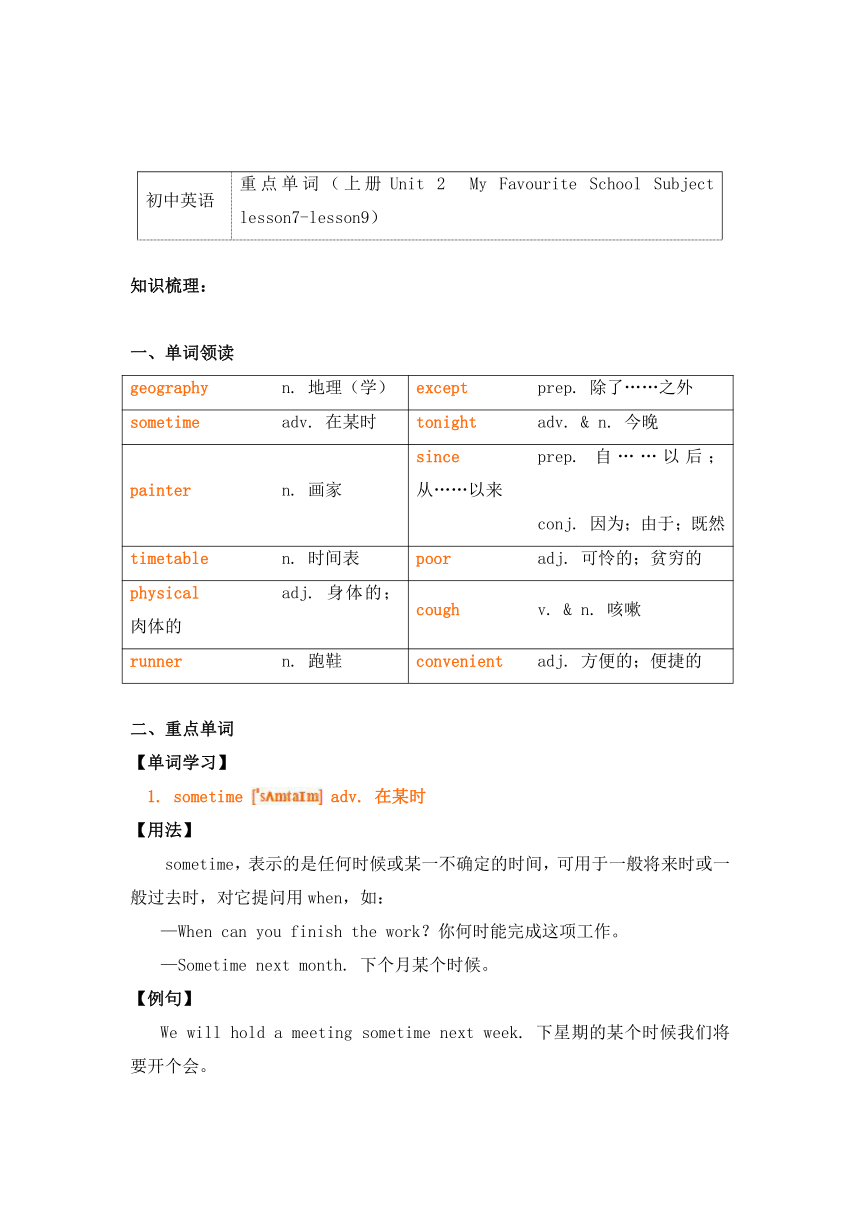
|
|
| 格式 | doc | ||
| 文件大小 | 245.3KB | ||
| 资源类型 | 教案 | ||
| 版本资源 | 冀教版 | ||
| 科目 | 英语 | ||
| 更新时间 | 2020-09-17 07:31:25 | ||
图片预览

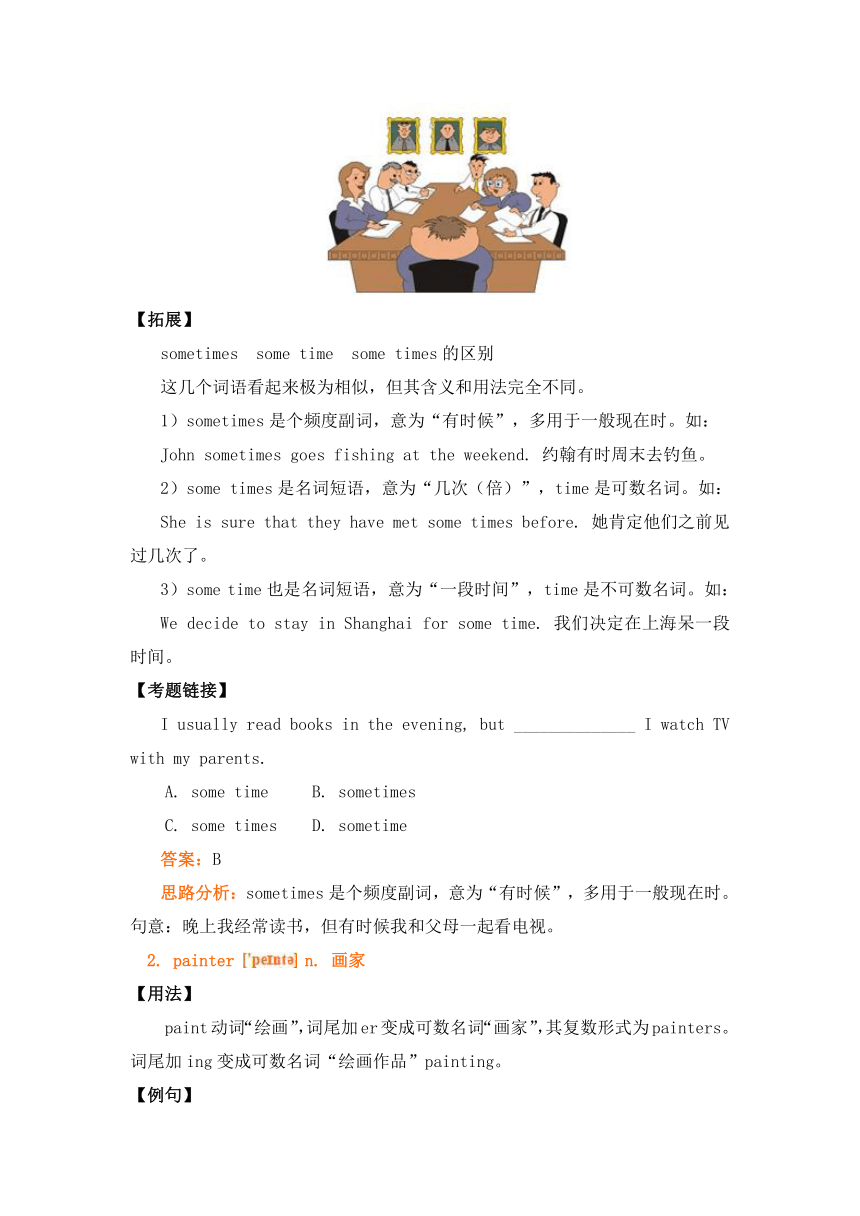
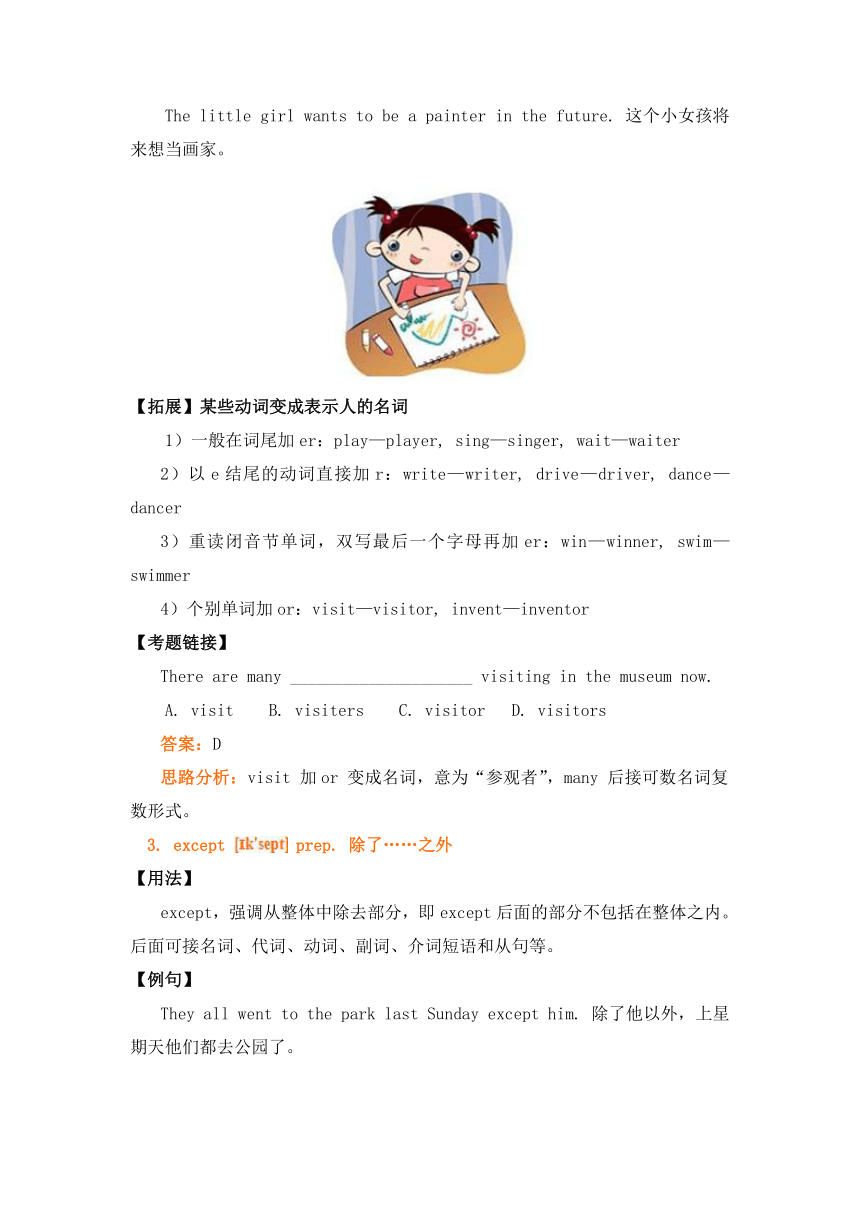
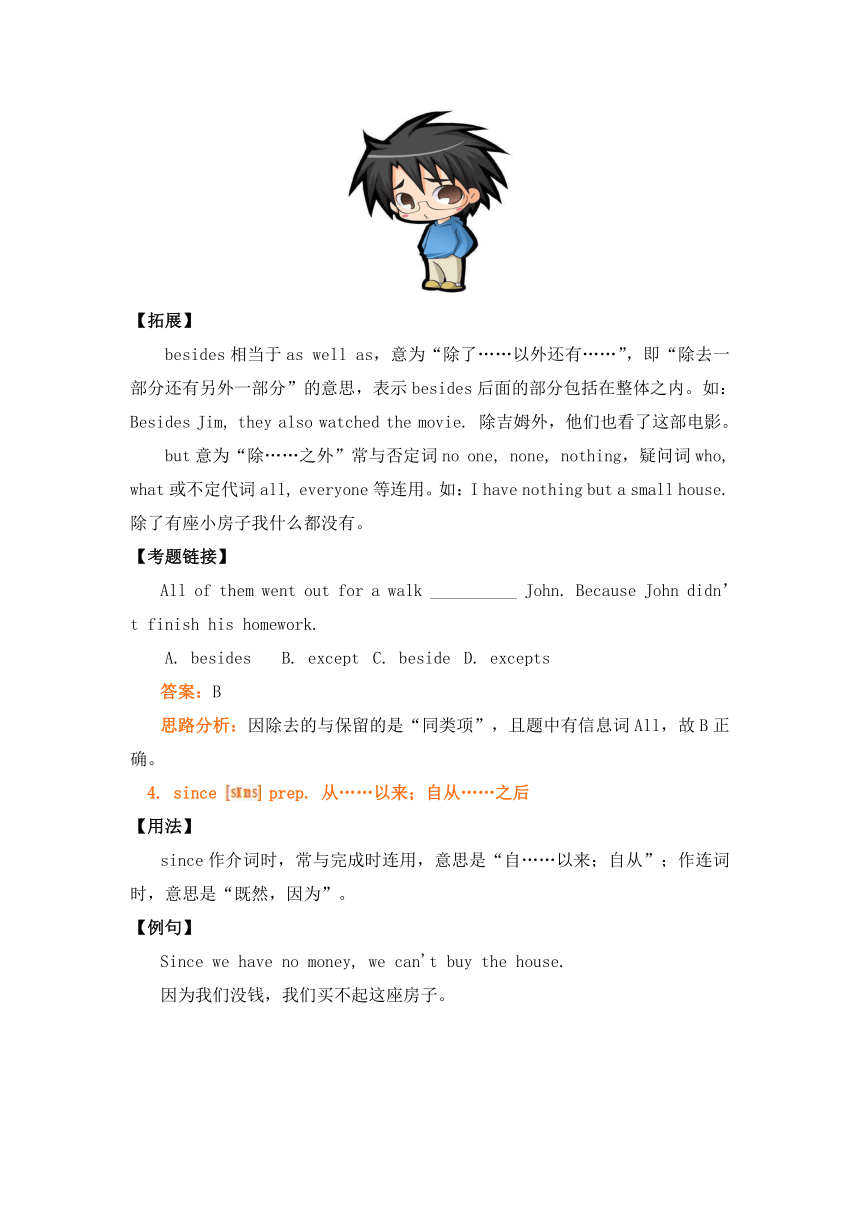
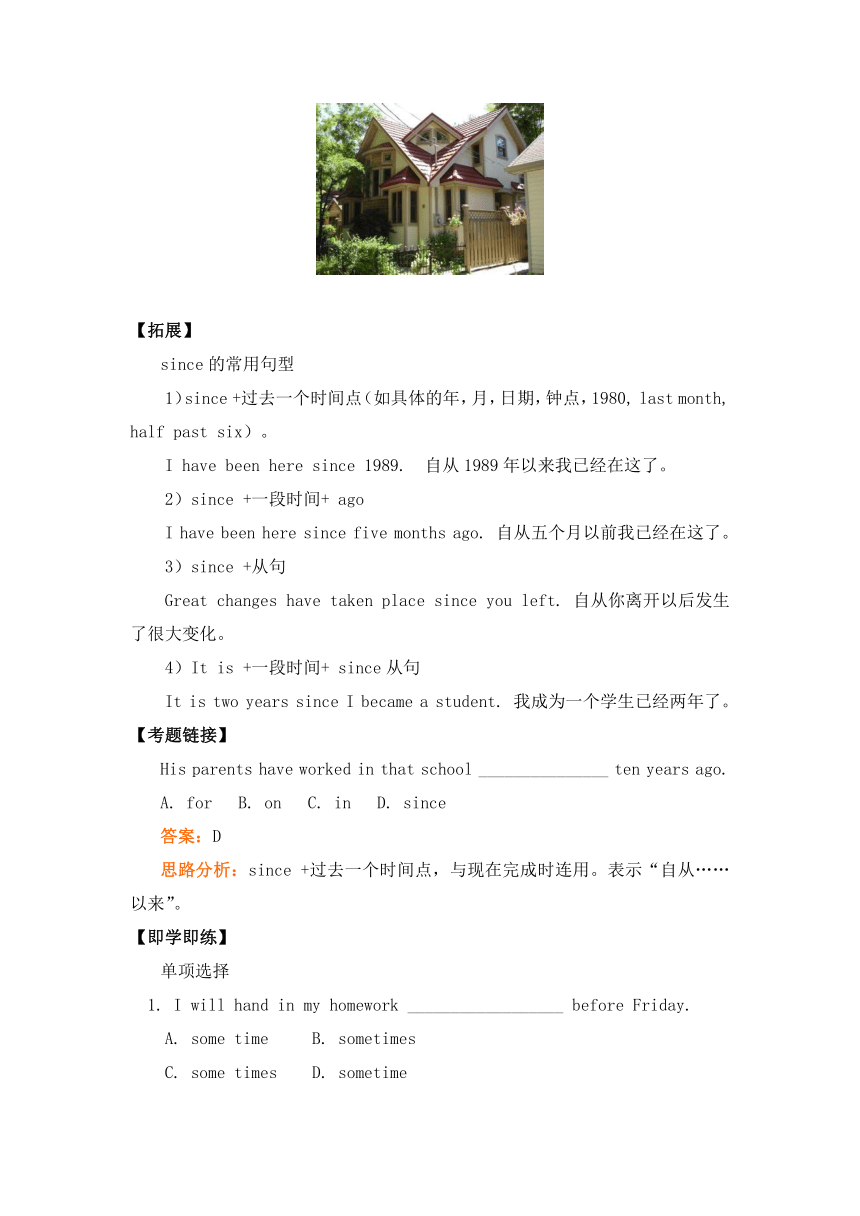
文档简介
初中英语 重点单词(上册Unit 2 My Favourite School Subject lesson7-lesson9)
知识梳理:
一、单词领读
geography n. 地理(学) except prep. 除了……之外
sometime adv. 在某时 tonight adv. & n. 今晚
painter n. 画家 since prep. 自……以后;从……以来
conj. 因为;由于;既然
timetable n. 时间表 poor adj. 可怜的;贫穷的
physical adj. 身体的;肉体的 cough v. & n. 咳嗽
runner n. 跑鞋 convenient adj. 方便的;便捷的
二、重点单词
【单词学习】
1. sometime adv. 在某时
【用法】
sometime,表示的是任何时候或某一不确定的时间,可用于一般将来时或一般过去时,对它提问用when,如:
—When can you finish the work?你何时能完成这项工作。
—Sometime next month. 下个月某个时候。
【例句】
We will hold a meeting sometime next week. 下星期的某个时候我们将要开个会。
【拓展】
sometimes some time some times的区别
这几个词语看起来极为相似,但其含义和用法完全不同。
1)sometimes是个频度副词,意为“有时候”,多用于一般现在时。如:
John sometimes goes fishing at the weekend. 约翰有时周末去钓鱼。
2)some times是名词短语,意为“几次(倍)”,time是可数名词。如:
She is sure that they have met some times before. 她肯定他们之前见过几次了。
3)some time也是名词短语,意为“一段时间”,time是不可数名词。如:
We decide to stay in Shanghai for some time. 我们决定在上海呆一段时间。
【考题链接】
I usually read books in the evening, but ______________ I watch TV with my parents.
A. some time B. sometimes
C. some times D. sometime
答案:B
思路分析:sometimes是个频度副词,意为“有时候”,多用于一般现在时。句意:晚上我经常读书,但有时候我和父母一起看电视。
2. painter n. 画家
【用法】
paint动词“绘画”,词尾加er变成可数名词“画家”,其复数形式为painters。词尾加ing变成可数名词“绘画作品”painting。
【例句】
The little girl wants to be a painter in the future. 这个小女孩将来想当画家。
【拓展】某些动词变成表示人的名词
1)一般在词尾加er:play—player, sing—singer, wait—waiter
2)以e结尾的动词直接加r:write—writer, drive—driver, dance—dancer
3)重读闭音节单词,双写最后一个字母再加er:win—winner, swim—swimmer
4)个别单词加or:visit—visitor, invent—inventor
【考题链接】
There are many _____________________ visiting in the museum now.
A. visit B. visiters C. visitor D. visitors
答案:D
思路分析:visit 加or 变成名词,意为“参观者”,many 后接可数名词复数形式。
3. except prep. 除了……之外
【用法】
except,强调从整体中除去部分,即except后面的部分不包括在整体之内。后面可接名词、代词、动词、副词、介词短语和从句等。
【例句】
They all went to the park last Sunday except him. 除了他以外,上星期天他们都去公园了。
【拓展】
besides相当于as well as,意为“除了……以外还有……”,即“除去一部分还有另外一部分”的意思,表示besides后面的部分包括在整体之内。如:Besides Jim, they also watched the movie. 除吉姆外,他们也看了这部电影。
but意为“除……之外”常与否定词no one, none, nothing,疑问词who, what或不定代词all, everyone等连用。如:I have nothing but a small house. 除了有座小房子我什么都没有。
【考题链接】
All of them went out for a walk __________ John. Because John didn’t finish his homework.
A. besides B. except C. beside D. excepts
答案:B
思路分析:因除去的与保留的是“同类项”,且题中有信息词All,故B正确。
4. since prep. 从……以来;自从……之后
【用法】
since作介词时,常与完成时连用,意思是“自……以来;自从”;作连词时,意思是“既然,因为”。
【例句】
Since we have no money, we can't buy the house.
因为我们没钱,我们买不起这座房子。
【拓展】
since的常用句型
1)since +过去一个时间点(如具体的年,月,日期,钟点,1980, last month, half past six)。
I have been here since 1989. 自从1989年以来我已经在这了。
2)since +一段时间+ ago
I have been here since five months ago. 自从五个月以前我已经在这了。
3)since +从句
Great changes have taken place since you left. 自从你离开以后发生了很大变化。
4)It is +一段时间+ since从句
It is two years since I became a student. 我成为一个学生已经两年了。
【考题链接】
His parents have worked in that school _______________ ten years ago.
A. for B. on C. in D. since
答案:D
思路分析:since +过去一个时间点,与现在完成时连用。表示“自从……以来”。
【即学即练】
单项选择
1. I will hand in my homework __________________ before Friday.
A. some time B. sometimes
C. some times D. sometime
2. Li Ming sings very well. Maybe he will be a _______________ when he grows up.
A. dancer B. singer C. worker D. farmer
3. Does John know another foreign language __________________ French?
A. except B. but C. besides D. beside
4. Ann has been learning English _________________.
A. for 2012 B. since two years C. since 2012 D. in 2012
答案:1. D 解析:本题考查词义辨析。sometime,表示的是任何时候或某一不确定的时间,用于一般将来时,表示在将来的某个时候。
2. B 解析:本题考查语境理解。根据Li Ming sings very well可知,长大了他可能会成为一个歌唱家。
3. C 解析:本题考查词义辨析。由本题中的信息词“any other foreign language”,可知选besides。
4. C 解析:since +过去的时间点,与现在完成时连用。
同步练习:
(答题时间:15分钟)
Ⅰ. 单项选择
1. He is very kind. He often helps us ____________ our English after class.
A. in B. land C. with D. to
2. —What’s the matter with you?
—________________.
A. I like physics B. I hurt my finger
C. It’s time to go home D. Be quiet, please
3. It’s very kind _________________ you.
A. of B. for C. with D. to
4. There is _______________ with my bicycle. I have to go to school on foot.
A. something wrong B. wrong something
C. anything wrong D. wrong anything
Ⅱ. 完形填空
There are two terms __1__ a school year in America. The __2__ term is from September to January, and the second is from February to June. Most American __3__ begin to go to school __4__ they are five years old. Most students are seventeen __5__ eighteen years old when they finish high school.
__6__ school students take only four or five subjects each term. They usually go to the same classes every day, and they have __7__ for every class. After class. They do __8__ interesting things.
__9__ high school, many students go to college(大学). They can go to a small one or a large one. They usually have to pay a lot of __10__. So many college students work after class to get the money for their studies.
( )1. A. at B. on C. in D. for
( )2. A. one B. first C. two D. second
( )3. A. workers B. children C. teachers D. doctors
( )4. A. how B. where C. what D. when
( )5. A. or B. and C. but D. so
( )6. A. Height B. High C. Small D. Big
( )7. A. homeworks B. housework C. homework D. work
( )8. A. many B. much C. lot of D. lot
( )9. A. Before B. In C. After D. At
( )10. A. money B. food C. drinks D. books
Ⅲ. 阅读理解
Mike is my friend. He in from America. He is thirteen years old. We are in the tame class. He lives in Beijing with his parents now. He speaks English in his country. He doesn't know much Chinese. But he likes to read Chinese books very much.
On a Sunday morning he's going to the City's Library. He wants to read some books about how to learn Chinese. He starts to look for the books. But he can't find them. He goes to ask the librarian. He is afraid the librarian can't understand him. He speaks Chinese. But he can't say it well. He asks, “Where are the Chinese books?”
“There are all the Chinese books.” the librarian answers and brings some books about China. Mike doesn’t need the books. He asks again in English. This time the librarian understands him. She shows Mike the way to find the books. To Mike’s surprise, she can speak English very well.
1. Where is Mike from?________________________
A. He is from America. B. He is from China.
C. He comes from the U.K. D. He comes from England.
2. What does Mike speak in his country? ____________________
A. He speaks little English.
B. He speaks a little Chinese.
C. He speaks much English.
D. He speaks much Chinese.
3. Why is he going to the City’s Library? ____________________
A. Because it’s Sunday.
B. Because he wants to buy some books.
C. Because he wants to borrow some books.
D. Because he wants to talk to the librarian.
4. Can the librarian understand Mike when he speaks Chinese at first? ____________________
A. Yes, she do. B. Yes, she can.
C. No, she can’t. D. No, she isn’t.
5. What’s the main idea of the passage? ______________________
A. Mike in the library.
B. Mike speaks Chinese.
C. My friend—Mike.
D. Mike in Beijing.
答案:
Ⅰ. 1. C 解析:固定搭配,help sb. with sth.帮助某人做某事。
2. B 解析:问句意为:你怎么了?所以B更符合题意。
3. A 解析:本题考查介词辨析,kind 此处修饰you,表示“你真好心”,介词用of;表示“对……好”时,介词用to。
4. A 解析:固定句式:There is something wrong with … ……出了一些什么毛病。
Ⅱ. 1. C 解析:在一学年,用介词in。
2. B 解析:根据the second is from February to June. 可知此处选B。
3. B 解析:根据下文they are five years old可知此处选B。
4. D 解析:when意为“当……时候”。
5. A 解析:根据句意应该是十七或十八。
6. B 解析:根据上下文可知此处在说中学生。
7. C 解析:每一门课程都会有作业。可知选C。
8. A 解析:interesting things.可数名词复数,用many修饰。
9. C 解析:由many students go to college(大学)可知选C。
10. A 解析:由So many college students work after class to get the money for their studies.可知选A。
Ⅲ.
1. A 解析:由He in from America可知。
2. C
3. C 解析:由He wants to read some books about how to learn Chinese可知。
4. C 解析:由Mike doesn’t need the books. He asks again in English可知。
5. C 解析:由上下文可知。本文主要介绍我的朋友Mike。
知识梳理:
一、单词领读
geography n. 地理(学) except prep. 除了……之外
sometime adv. 在某时 tonight adv. & n. 今晚
painter n. 画家 since prep. 自……以后;从……以来
conj. 因为;由于;既然
timetable n. 时间表 poor adj. 可怜的;贫穷的
physical adj. 身体的;肉体的 cough v. & n. 咳嗽
runner n. 跑鞋 convenient adj. 方便的;便捷的
二、重点单词
【单词学习】
1. sometime adv. 在某时
【用法】
sometime,表示的是任何时候或某一不确定的时间,可用于一般将来时或一般过去时,对它提问用when,如:
—When can you finish the work?你何时能完成这项工作。
—Sometime next month. 下个月某个时候。
【例句】
We will hold a meeting sometime next week. 下星期的某个时候我们将要开个会。
【拓展】
sometimes some time some times的区别
这几个词语看起来极为相似,但其含义和用法完全不同。
1)sometimes是个频度副词,意为“有时候”,多用于一般现在时。如:
John sometimes goes fishing at the weekend. 约翰有时周末去钓鱼。
2)some times是名词短语,意为“几次(倍)”,time是可数名词。如:
She is sure that they have met some times before. 她肯定他们之前见过几次了。
3)some time也是名词短语,意为“一段时间”,time是不可数名词。如:
We decide to stay in Shanghai for some time. 我们决定在上海呆一段时间。
【考题链接】
I usually read books in the evening, but ______________ I watch TV with my parents.
A. some time B. sometimes
C. some times D. sometime
答案:B
思路分析:sometimes是个频度副词,意为“有时候”,多用于一般现在时。句意:晚上我经常读书,但有时候我和父母一起看电视。
2. painter n. 画家
【用法】
paint动词“绘画”,词尾加er变成可数名词“画家”,其复数形式为painters。词尾加ing变成可数名词“绘画作品”painting。
【例句】
The little girl wants to be a painter in the future. 这个小女孩将来想当画家。
【拓展】某些动词变成表示人的名词
1)一般在词尾加er:play—player, sing—singer, wait—waiter
2)以e结尾的动词直接加r:write—writer, drive—driver, dance—dancer
3)重读闭音节单词,双写最后一个字母再加er:win—winner, swim—swimmer
4)个别单词加or:visit—visitor, invent—inventor
【考题链接】
There are many _____________________ visiting in the museum now.
A. visit B. visiters C. visitor D. visitors
答案:D
思路分析:visit 加or 变成名词,意为“参观者”,many 后接可数名词复数形式。
3. except prep. 除了……之外
【用法】
except,强调从整体中除去部分,即except后面的部分不包括在整体之内。后面可接名词、代词、动词、副词、介词短语和从句等。
【例句】
They all went to the park last Sunday except him. 除了他以外,上星期天他们都去公园了。
【拓展】
besides相当于as well as,意为“除了……以外还有……”,即“除去一部分还有另外一部分”的意思,表示besides后面的部分包括在整体之内。如:Besides Jim, they also watched the movie. 除吉姆外,他们也看了这部电影。
but意为“除……之外”常与否定词no one, none, nothing,疑问词who, what或不定代词all, everyone等连用。如:I have nothing but a small house. 除了有座小房子我什么都没有。
【考题链接】
All of them went out for a walk __________ John. Because John didn’t finish his homework.
A. besides B. except C. beside D. excepts
答案:B
思路分析:因除去的与保留的是“同类项”,且题中有信息词All,故B正确。
4. since prep. 从……以来;自从……之后
【用法】
since作介词时,常与完成时连用,意思是“自……以来;自从”;作连词时,意思是“既然,因为”。
【例句】
Since we have no money, we can't buy the house.
因为我们没钱,我们买不起这座房子。
【拓展】
since的常用句型
1)since +过去一个时间点(如具体的年,月,日期,钟点,1980, last month, half past six)。
I have been here since 1989. 自从1989年以来我已经在这了。
2)since +一段时间+ ago
I have been here since five months ago. 自从五个月以前我已经在这了。
3)since +从句
Great changes have taken place since you left. 自从你离开以后发生了很大变化。
4)It is +一段时间+ since从句
It is two years since I became a student. 我成为一个学生已经两年了。
【考题链接】
His parents have worked in that school _______________ ten years ago.
A. for B. on C. in D. since
答案:D
思路分析:since +过去一个时间点,与现在完成时连用。表示“自从……以来”。
【即学即练】
单项选择
1. I will hand in my homework __________________ before Friday.
A. some time B. sometimes
C. some times D. sometime
2. Li Ming sings very well. Maybe he will be a _______________ when he grows up.
A. dancer B. singer C. worker D. farmer
3. Does John know another foreign language __________________ French?
A. except B. but C. besides D. beside
4. Ann has been learning English _________________.
A. for 2012 B. since two years C. since 2012 D. in 2012
答案:1. D 解析:本题考查词义辨析。sometime,表示的是任何时候或某一不确定的时间,用于一般将来时,表示在将来的某个时候。
2. B 解析:本题考查语境理解。根据Li Ming sings very well可知,长大了他可能会成为一个歌唱家。
3. C 解析:本题考查词义辨析。由本题中的信息词“any other foreign language”,可知选besides。
4. C 解析:since +过去的时间点,与现在完成时连用。
同步练习:
(答题时间:15分钟)
Ⅰ. 单项选择
1. He is very kind. He often helps us ____________ our English after class.
A. in B. land C. with D. to
2. —What’s the matter with you?
—________________.
A. I like physics B. I hurt my finger
C. It’s time to go home D. Be quiet, please
3. It’s very kind _________________ you.
A. of B. for C. with D. to
4. There is _______________ with my bicycle. I have to go to school on foot.
A. something wrong B. wrong something
C. anything wrong D. wrong anything
Ⅱ. 完形填空
There are two terms __1__ a school year in America. The __2__ term is from September to January, and the second is from February to June. Most American __3__ begin to go to school __4__ they are five years old. Most students are seventeen __5__ eighteen years old when they finish high school.
__6__ school students take only four or five subjects each term. They usually go to the same classes every day, and they have __7__ for every class. After class. They do __8__ interesting things.
__9__ high school, many students go to college(大学). They can go to a small one or a large one. They usually have to pay a lot of __10__. So many college students work after class to get the money for their studies.
( )1. A. at B. on C. in D. for
( )2. A. one B. first C. two D. second
( )3. A. workers B. children C. teachers D. doctors
( )4. A. how B. where C. what D. when
( )5. A. or B. and C. but D. so
( )6. A. Height B. High C. Small D. Big
( )7. A. homeworks B. housework C. homework D. work
( )8. A. many B. much C. lot of D. lot
( )9. A. Before B. In C. After D. At
( )10. A. money B. food C. drinks D. books
Ⅲ. 阅读理解
Mike is my friend. He in from America. He is thirteen years old. We are in the tame class. He lives in Beijing with his parents now. He speaks English in his country. He doesn't know much Chinese. But he likes to read Chinese books very much.
On a Sunday morning he's going to the City's Library. He wants to read some books about how to learn Chinese. He starts to look for the books. But he can't find them. He goes to ask the librarian. He is afraid the librarian can't understand him. He speaks Chinese. But he can't say it well. He asks, “Where are the Chinese books?”
“There are all the Chinese books.” the librarian answers and brings some books about China. Mike doesn’t need the books. He asks again in English. This time the librarian understands him. She shows Mike the way to find the books. To Mike’s surprise, she can speak English very well.
1. Where is Mike from?________________________
A. He is from America. B. He is from China.
C. He comes from the U.K. D. He comes from England.
2. What does Mike speak in his country? ____________________
A. He speaks little English.
B. He speaks a little Chinese.
C. He speaks much English.
D. He speaks much Chinese.
3. Why is he going to the City’s Library? ____________________
A. Because it’s Sunday.
B. Because he wants to buy some books.
C. Because he wants to borrow some books.
D. Because he wants to talk to the librarian.
4. Can the librarian understand Mike when he speaks Chinese at first? ____________________
A. Yes, she do. B. Yes, she can.
C. No, she can’t. D. No, she isn’t.
5. What’s the main idea of the passage? ______________________
A. Mike in the library.
B. Mike speaks Chinese.
C. My friend—Mike.
D. Mike in Beijing.
答案:
Ⅰ. 1. C 解析:固定搭配,help sb. with sth.帮助某人做某事。
2. B 解析:问句意为:你怎么了?所以B更符合题意。
3. A 解析:本题考查介词辨析,kind 此处修饰you,表示“你真好心”,介词用of;表示“对……好”时,介词用to。
4. A 解析:固定句式:There is something wrong with … ……出了一些什么毛病。
Ⅱ. 1. C 解析:在一学年,用介词in。
2. B 解析:根据the second is from February to June. 可知此处选B。
3. B 解析:根据下文they are five years old可知此处选B。
4. D 解析:when意为“当……时候”。
5. A 解析:根据句意应该是十七或十八。
6. B 解析:根据上下文可知此处在说中学生。
7. C 解析:每一门课程都会有作业。可知选C。
8. A 解析:interesting things.可数名词复数,用many修饰。
9. C 解析:由many students go to college(大学)可知选C。
10. A 解析:由So many college students work after class to get the money for their studies.可知选A。
Ⅲ.
1. A 解析:由He in from America可知。
2. C
3. C 解析:由He wants to read some books about how to learn Chinese可知。
4. C 解析:由Mike doesn’t need the books. He asks again in English可知。
5. C 解析:由上下文可知。本文主要介绍我的朋友Mike。
同课章节目录
- Unit 1 Me and My Class
- Lesson 1 Back to School!
- Lesson 2 Many Faces, One Picture
- Lesson 3 Getting to Know You!
- Lesson 4 Best Friends
- Lesson 5 Meet Ms. Liu
- Lesson 6 Jenny's Week
- Unit 2 My Favourite School Subject
- Lesson 7 Don't Be Late for Class!
- Lesson 8 E-mail Helpers!
- Lesson 9 I Don't Want to Miss Geography !
- Lesson 10 Looking for Lisa
- Lesson 11 Lily Learns about China !
- Lesson 12 Karen's Hair Stood Up!
- Unit Review
- Unit 3 Families Celebrate Togethe
- Lesson 13 I Love Autumn
- Lesson 14 Happy Memories
- Lesson 15 A Present for Li Ming!
- Lesson 16 Happy Thanksgiving!
- Lesson 17 Presents from Canada!
- Lesson 18 Li Ming's Birthday
- Unit Review
- Unit 4 My Neighbourhood
- Lesson 19 The Best Neighourhood
- Lesson 20 No Stopping!
- Lesson 21 Eat a Donut and Turn Right
- Lesson 22 I Like My Neighbourhood
- Lesson 23 People in My Neighbourhood
- Lesson 24 I Need a Map!
- Unit Review
- Unit 5 My Future
- Lesson 25 I Want to Be a Teacher!
- Lesson 26 What Will I Be ?
- Lesson 27 What's Your Advice?
- Lesson 28 Rich or Poor? It Doesn't Matter!
- Lesson 29 Our Ambitions and Dreams
- Lesson 30 A Famous Friend?
- Unit Review
- Unit 6 Go With Transportation !
- Lesson 31 How Do You Travel ?
- Lesson 32 Trains Go Faster !
- Lesson 33 Life on Wheels
- Lesson 34 Flying Donuts
- Lesson 35 Future Transportation
- Lesson 36 Clean Cars ?
- Unit Review
- Unit 7 Enjoy Your Hobby
- Lesson 37 What's Your Hobby ?
- Lesson 38 Hobbies Are Fun!
- Lesson 39 Danny's Hobby
- Lesson 40 What's Paul's Hobby?
- Lesson 41 Show and Tell!
- Lesson 42 The New Club
- Unit Review
- Unit 8 Celebrating Me
- Lesson 43 What Makes You Unique?
- Lesson 44 Georgia Plays Basketball
- Lesson 45 Be Yourself !
- Lesson 46 My Dream
- Lesson 47 I Made It !
- Lesson 48 Li Ming's Report
- Unit Review
